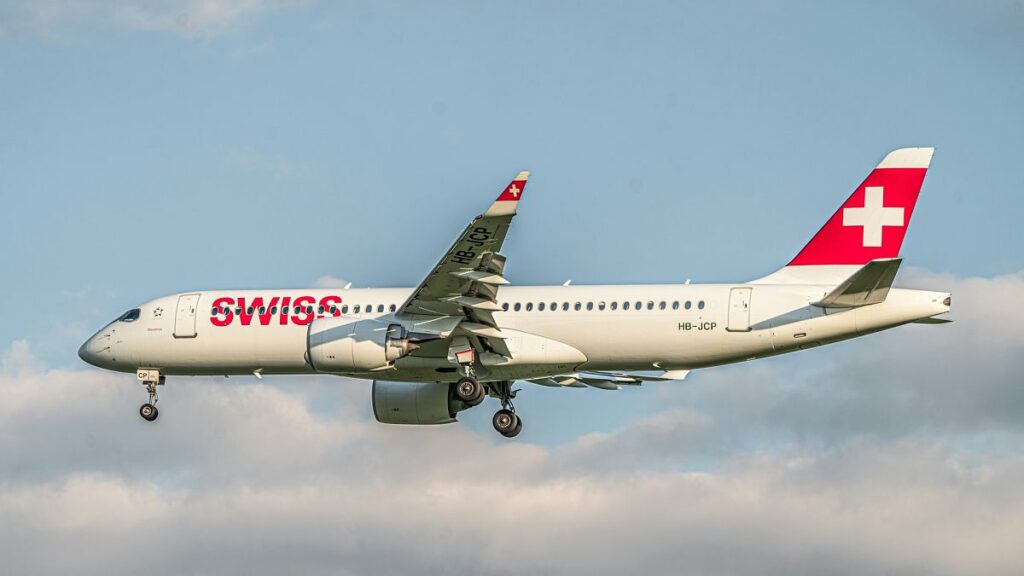Travellers heading to or through Switzerland this summer may find themselves unexpectedly grounded.
The country’s national airline, Swiss, has confirmed it will cancel around 1,400 flights from now through October as it confronts an ongoing shortage of pilots.
The cuts will affect multiple short-haul routes from Zurich and Geneva, including flights across Europe. Some long-haul services, such as those to Shanghai and Chicago, will also operate less frequently.
And some routes, including its summer service to Hurghada in Egypt, have been suspended entirely.
What Swiss is doing to address the shortfall
Swiss says it ‘deeply regrets’ the situation and has introduced a range of short-term fixes to address its pilot shortage. Those include a voluntary retirement deferral program, a vacation buyback scheme and encouraging part-time pilots to increase hours.
The airline is also working with its pilot union, Aeropers, to improve roster flexibility and reduce last-minute, fatigue-related absences – all measures meant to help the national carrier alleviate its need for about 70 more full-time pilots.
Swiss has promised to notify passengers of changes as early as possible. Affected travellers will be rebooked on flights with Swiss, the Lufthansa Group, other carriers in the Star Alliance network or – in the worst-case scenario – any other available airline.
Passengers can also rebook or request a full refund.
Could this be Europe’s summer of cancellations?
Swiss is not the only airline facing turbulence. Carriers across Europe are trimming schedules and forming contingency plans to cope with a mounting shortage of cockpit crew.
KLM has publicly acknowledged difficulties staffing long-haul flights this summer, even though it claims to have more pilots than ever on its roster.
“Sick leave and part-time work have increased in recent years. We lose around 50 full-time jobs a year due to all the part-time work,” Eimerd Bult, head of KLM’s flight service, said last September, as reported by Dutch newspaper the Telegraaf.
Air France pilots are temporarily operating KLM flights on certain routes, including Amsterdam to New York, from July until October this year.
British Airways and easyJet, meanwhile, are aggressively recruiting new staff, battling one another with competitive perks to poach from their rivals and lure back retired pilots.
British Airways, for example, has offered to foot the bill for pilot training – which can cost as much as €100,000 – for up to 60 prospects per year.
This comes after the airline suspended several short-haul routes this summer, including flights from London Gatwick to Santorini and Mykonos, and select routes from Heathrow to Greece and Croatia.
Why are there so few pilots?
The pandemic paused new pilot training and accelerated retirements, a one-two punch the industry has yet to recover from. In the US alone, the FAA projects about 4,300 pilot retirements each year through 2042.
Europe faces a similar crunch. Although some airlines previously had long waiting lists for pilot slots, today they’re easing language and nationality requirements to widen the pool.
The problem isn’t just retirement, though. It’s the pipeline.
Boeing’s long-term outlook estimates that the world will need 674,000 new pilots over the next two decades. By 2032, consulting firm Oliver Wyman says the sector could lack nearly 80,000 pilots globally.
Europe alone could be 19,000 pilots short of demand.
What does this mean for summer flyers?
Travellers with short-haul bookings, especially those involving connections, should brace for disruption as European carriers thin their summer schedules.
Experts caution that these tighter schedules may result in fewer direct flights, longer layovers and more competition for seats. Travellers are advised to book early, allow extra time for transfers and monitor airline notifications closely.
Though rebooking and refund policies are in place, securing the best alternative could come down to how fast you move.
Read the full article here







